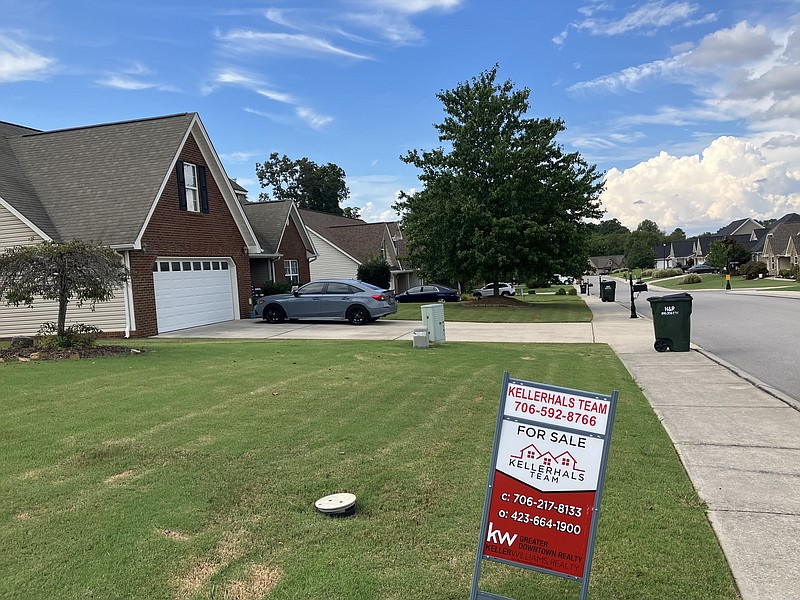A sharp increase in 2021 Northwest Georgia property values coincides with a study that found Georgia led the nation in investor purchases of homes.
The Pew Research Center study found that 33% of Georgia home sales in 2021 went to investors, while a regional real estate broker and analyst found 8% to 10% of home sales in the Greater Chattanooga area over the past 12 months went to investors.
That's up from 3% to 5% of home sales going to investors two years ago, according to Brandon King, an affiliate broker with Ringgold-based DK Real Estate.
"So it has been a palpable and calculable difference, in terms of the out-of-state, out-of-area buyers," King said in a phone interview.
"Realistically, it (out-of-state investors) is going to increase pressures to buyers, but honestly, at this point, if buyers are starting to say, I'm not willing to pay the price the sellers are trying to charge, due to interest rates or whatever, it could also help keep the market up for a little bit longer during a lull."
King said an investor is identified by the fact that their tax bill is sent to an address not in the Greater Chattanooga area. King defines Greater Chattanooga, the area he serves and analyzes, as Hamilton County and Walker and Catoosa counties in Georgia.
Earlier this summer, property assessments were increased 25% in Walker County and 22% in Whitfield County, Georgia, to account for a hot real estate market. Catoosa County officials decided not to conduct a reassessment this year, county spokesman John Pless said in a phone interview. Citing that "housing prices are through the roof," he said the county wanted to hold the line but is not sure what will be decided next year.
(READ MORE: Higher property assessments follow jump in Walker County, Georgia, housing sales)
In mid-June, when the new assessments were announced, Terry Gilreath, chief appraiser for Walker County, said in a media statement he's seen some property prices double over the past few years. The sales have been "ridiculous," he said -- a trend he said he's seen across all of Georgia.
In a July media statement, Ashley O'Donald, Whitfield County's chief appraiser, said it's been the most "bullish" market he's seen in 20 years. But Jevin Jensen, chairman of the Whitfield County Board of Commissioners, said in a phone interview he thinks increased housing supply in Whitfield County and higher interest rates will moderate the market by next year.
While Georgia topped the 2021 list of investor-bought homes at 33%, the Pew study found investors bought 24% of single-family homes nationwide. Tennessee was above the national average at 26%, and following Georgia was Arizona (31%), Nevada (30%) and California and Texas (both at 29%).
Researchers at Georgia Tech, quoted by Pew in July, found that in Georgia, investors targeted small, affordable houses in the Atlanta suburbs in mostly Black working-class neighborhoods.
In an email, Tim Henderson, the journalist who wrote the story for Pew's publication Stateline, said he received the data from CoreLogic, a California-based data analytics firm. Describing how the analytics firm identified investors, Henderson said, "Basically, they get this by looking for owners who don't get homestead exemptions (thus don't live in the house) and have some kind of identifiable company name or LLC in the owner name."
While some local officials are fighting for more regulation of rental properties, in February, the Georgia General Assembly attempted to outlaw local governments from enacting restrictions on long-term rentals. The legislation, House Bill 1093 and Senate Bill 494, died in committee.
In the Greater Chattanooga area, King said house flipping was "taking charge" as investments a year ago, but labor and price pressures have made it hard to make the numbers work. Chattanooga put a moratorium on short-term rentals such as Airbnb, but he said Georgia has been more "lax" on restrictions -- with the exception of Ringgold, where new regulations have stopped the opening of new short-term rentals completely.
King said, and the numbers reflect, that in the Greater Chattanooga area, it's difficult for large-scale investors to buy multiple houses, unlike in a densely-populated area where proximity makes the properties easier to manage.
"In our market, to buy 100 houses, you're going to have to go 50 miles out, where in Atlanta, you can buy 100 houses in four or five blocks," King said.
Generally, he said, the market is improving for home buyers.
"Relative to a year ago, I'd say it went from a D-minus for a buyer to a B-plus, or B, relative to four years ago, they were at an A," King said.
Prices have continued to rise, but the speed of the increase has started to "relax," he said, and optimistic sellers aren't getting what they're expecting any more. Housing supply has rebounded, King said, and is three or four times higher than what they were at the lowest point the market hit a year or two ago -- but that's still very low relative to the healthy market of three or four years ago.
King said that if he could make a suggestion to elected officials about how to improve the market for homebuyers in the area, he said he'd like to see more opportunities for the zoning of smaller houses. He said he sees multiple offers on smaller homes -- around 1,200 square feet -- even though builders often focus on constructing larger houses.
Contact Andrew Wilkins at awilkins@timesfreepress.com or 423-757-6659. Follow him on Twitter @tweetatwilkins.
